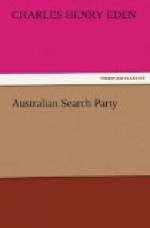But drowsiness was fast closing the eyes of poor Cato, and, as the last chance, we compelled him to walk about, despite his piteous prayers for repose. It soon became evident that our labour was thrown away, for he dropped heavily down from between the two men who were supporting him, and no power could induce him to rise. A heavy stertorous sleep overwhelmed him, his breath came gradually slower and slower, and about two hours from the time of the accident, poor Cato passed away, peacefully and without pain.
Can no antidote be discovered for this virulent poison? Empirics are common who profess to cure snake-bites, but I doubt if they ever really succeed. It is beyond all question that in the early days of Australia, and whilst this beautiful continent was held by Great Britain as nothing more than a useful place for the safe custody of her criminal classes, a convict named Underwood discovered a remedy for snake-bite, and in many cases treated it successfully. The story has by no means died out in the colonies, of the good old laws of brutal terrorism, under which, when a bitten man was brought to Underwood, the latter proceeded to apply his remedy, stimulated by the pleasing threat of a severe flogging, should his treatment be of no avail. He appears to have been a man of great firmness of purpose, for he never could be betrayed into divulging his secret, though many unworthy means were resorted to for that end. The utmost that he would acknowledge was that the antidote was common, and that Australians trampled it under-foot every day of their lives. The way he became acquainted with the remedy was by accidentally witnessing a fight between a snake and an iguana. The latter was frequently bitten, and in every case ran to a certain plant and ate it before renewing the contest, in which it was ultimately victorious, leaving the serpent dead upon the plain. Underwood demanded his pardon and liberty as the price of his precious knowledge, and I believe a mixed commission of military men and civilians deliberated on the case at Sydney, and decided not to grant the convict’s request. In due time he died, and with him perished his invaluable secret. It is to be presumed the commission knew what they were about, but undoubtedly their adverse




